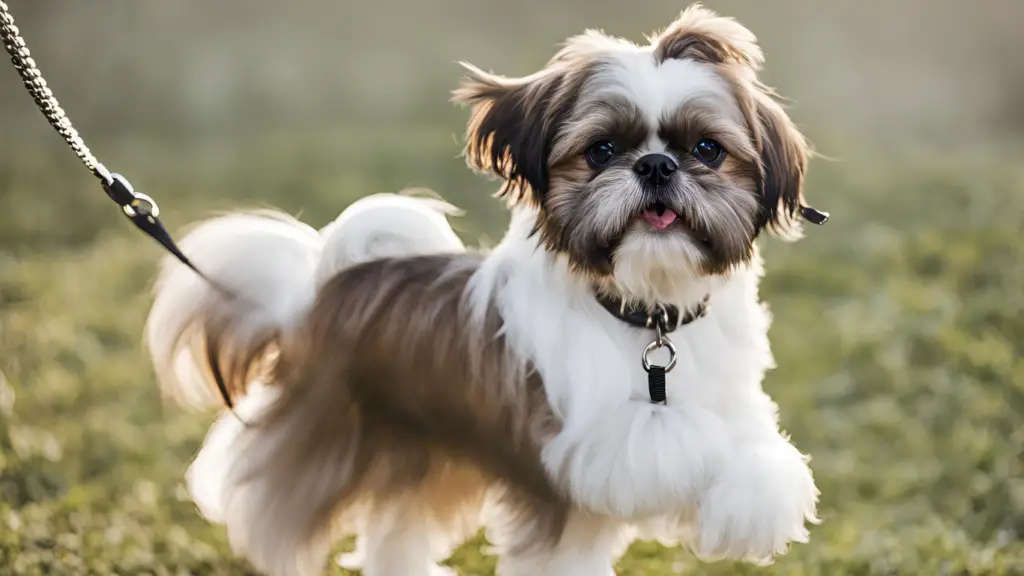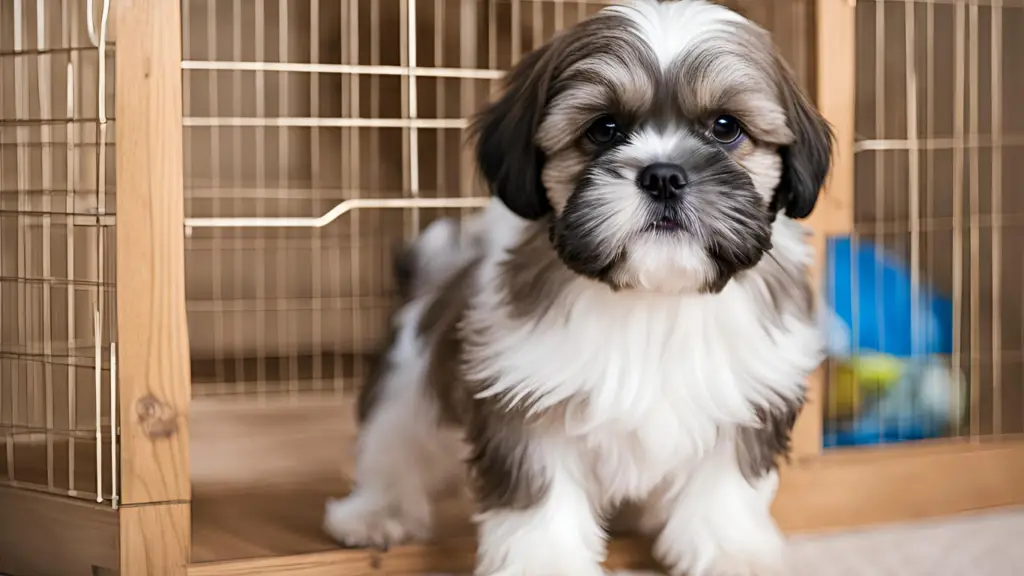
Shih Tzus are known for their affectionate and friendly nature, but they can also be prone to anxiety. Understanding the signs of anxiety and knowing how to manage it effectively is crucial for maintaining your Shih Tzu’s well-being. Here are some techniques and tips to help manage your Shih Tzu’s anxiety.
Recognizing the Signs of Anxiety

Recognizing the signs of anxiety in your Shih Tzu is the first step toward managing it. Common signs include excessive barking, trembling, pacing, and destructive behavior. Your Shih Tzu might also exhibit physical symptoms such as drooling, panting, or even gastrointestinal issues like diarrhea. Identifying these signs early can help you intervene before the anxiety escalates.
Behavioral changes are another indicator. A previously social Shih Tzu might start avoiding people or other pets, become unusually clingy, or show signs of fear in situations where they were previously comfortable. Monitoring your dog’s behavior closely will help you spot these changes and address them promptly.
Creating a Safe Space

Creating a safe space for your Shih Tzu can significantly reduce anxiety. This space should be a quiet, comfortable area where your dog can retreat when feeling stressed. Include their favorite toys, a cozy bed, and perhaps an item of your clothing to provide comfort.
A designated safe space can help your Shih Tzu feel secure during stressful events, such as thunderstorms or when guests visit. Consistency is key, so ensure this space is always accessible and associated with positive experiences. You might also consider using calming pheromone diffusers or sprays in this area to further ease their anxiety.
Establishing a Routine

Dogs thrive on routine, and Shih Tzus are no exception. Establishing a consistent daily routine can help reduce anxiety by providing a sense of predictability and security. Regular feeding times, walks, and play sessions can create a stable environment for your dog.
Consistency in training and daily activities can also help alleviate anxiety. When your Shih Tzu knows what to expect, they are less likely to feel anxious or stressed. Try to stick to the same schedule every day, even on weekends, to maintain a stable routine.
Exercise and Mental Stimulation

Regular exercise and mental stimulation are essential for managing anxiety in Shih Tzus. Daily walks, playtime, and interactive toys can help burn off excess energy and keep your dog mentally engaged. A tired dog is generally a happier and less anxious dog.
Puzzle toys and training sessions can provide the mental stimulation your Shih Tzu needs. Incorporate activities that challenge their mind and body to keep them occupied and reduce anxiety. Training sessions not only stimulate your dog’s brain but also reinforce positive behaviors and strengthen the bond between you and your pet.
Using Calming Aids

Calming aids can be beneficial for managing anxiety in Shih Tzus. Products such as calming collars, supplements, and anxiety wraps (like Thundershirts) can provide relief during stressful situations. These aids can help create a sense of security and comfort for your dog.
Calming treats and chews containing natural ingredients like chamomile, valerian root, and CBD can also help soothe your anxious Shih Tzu. Consult with your veterinarian before introducing any new supplements to ensure they are safe and appropriate for your dog.
Behavioral Training

Behavioral training can play a crucial role in managing anxiety. Positive reinforcement techniques can help your Shih Tzu associate stressful situations with positive outcomes. Reward your dog with treats, praise, or playtime when they exhibit calm behavior during anxiety-inducing events.
Desensitization and counter-conditioning are effective training methods for reducing anxiety. Gradually expose your Shih Tzu to the source of their anxiety in a controlled and positive manner. Over time, this can help change their response to the trigger from fear to relaxation.
Consulting a Professional

In severe cases of anxiety, consulting a professional, such as a veterinarian or a certified animal behaviorist, may be necessary. They can provide a comprehensive assessment of your Shih Tzu’s anxiety and recommend appropriate treatment options. This might include behavior modification techniques, medication, or a combination of both.
Medication should always be considered a last resort and used under the guidance of a veterinarian. Anti-anxiety medications can be effective for managing severe anxiety, but they should be part of a broader treatment plan that includes behavioral training and environmental management.
Socialization

Proper socialization is essential for reducing anxiety in Shih Tzus. Expose your dog to a variety of people, animals, and environments from a young age to build their confidence and reduce fearfulness. Positive social experiences can help your Shih Tzu become more adaptable and less prone to anxiety.
Regularly introduce your Shih Tzu to new experiences in a controlled and positive manner. Gradual exposure to different stimuli, such as other dogs, busy streets, and different sounds, can help them become more resilient to stressors. Always monitor your dog’s reactions and provide positive reinforcement to ensure they remain comfortable.
Massage and Touch Therapy

Massage and touch therapy can have a calming effect on your Shih Tzu. Gentle massages can help relax tense muscles, improve circulation, and promote a sense of well-being. Incorporate touch therapy into your daily routine to help reduce anxiety and strengthen the bond between you and your dog.
Certain techniques, such as Tellington TTouch, involve specific patterns of touch and movement to promote relaxation and reduce stress. Learning and practicing these techniques can provide significant benefits for your anxious Shih Tzu. Consult with a professional trained in pet massage or touch therapy to learn the best methods for your dog.
Aromatherapy

Aromatherapy can be a useful tool for managing anxiety in Shih Tzus. Essential oils such as lavender, chamomile, and frankincense have calming properties that can help soothe your dog. Use a diffuser or diluted sprays to introduce these scents into your home.
Ensure that any essential oils you use are safe for pets and used in appropriate concentrations. Some essential oils can be toxic to dogs, so always do your research and consult with your veterinarian before using aromatherapy. Introduce scents gradually to avoid overwhelming your Shih Tzu.
Monitoring Diet and Nutrition

A well-balanced diet can play a role in managing anxiety. Ensure your Shih Tzu is getting the right nutrients to support their overall health and well-being. Certain foods and supplements, such as those rich in omega-3 fatty acids, can help promote a calm and stable mood.
Avoid feeding your Shih Tzu foods that can contribute to hyperactivity or anxiety, such as those high in sugar and artificial additives. Consult with your veterinarian to develop a diet plan that supports your dog’s mental and physical health. Proper nutrition can have a positive impact on your Shih Tzu’s behavior and anxiety levels.
Reducing Environmental Stressors

Identifying and reducing environmental stressors can help manage your Shih Tzu’s anxiety. Loud noises, sudden changes, and chaotic environments can all contribute to stress. Minimize exposure to these triggers and create a calm, stable environment for your dog.
Use white noise machines or calming music to mask loud sounds and create a soothing atmosphere. Maintaining a tidy and organized living space can also reduce anxiety, as clutter and chaos can be overwhelming for your Shih Tzu. Consistent, gentle handling and positive interactions can further help your dog feel secure.
Providing Comfort During Separation

Separation anxiety is common in Shih Tzus and can be challenging to manage. Gradual desensitization to your departures and arrivals can help reduce anxiety. Start with short absences and gradually increase the duration as your dog becomes more comfortable.
Create a positive association with being alone by providing special toys or treats that are only available when you’re away. Leaving a piece of clothing with your scent can also provide comfort to your Shih Tzu during your absence. Ensuring they have a comfortable and secure space while you’re gone can help ease their anxiety.
Using Technology

Technology can be a valuable tool in managing your Shih Tzu’s anxiety. Interactive toys and pet cameras can help keep your dog engaged and provide comfort when you’re not home. Some pet cameras even allow you to talk to your dog and dispense treats remotely, helping to ease separation anxiety.
There are also mobile apps designed to provide calming music and sounds specifically for dogs. These apps can be particularly useful during stressful events, such as thunderstorms or fireworks. Explore different technological solutions to find what works best for your Shih Tzu.
Conclusion
Managing Shih Tzu anxiety requires a comprehensive approach that includes recognizing the signs, creating a safe and consistent environment, providing mental and physical stimulation, and using calming aids and techniques. By understanding your Shih Tzu’s needs and using a combination of these strategies, you can help reduce their anxiety and improve their quality of life.
Always consult with a veterinarian or a professional dog trainer if your Shih Tzu’s anxiety persists or worsens. With patience, consistency, and the right approach, you can create a calm and secure environment for your Shih Tzu, helping them lead a happier and healthier life.


